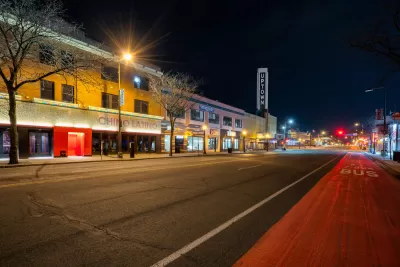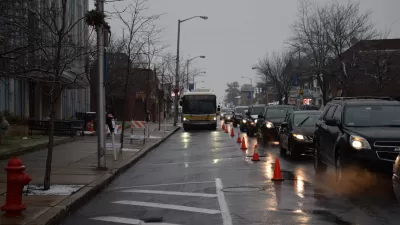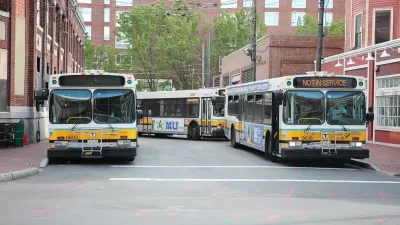The city's plan to reduce street parking by 90% in favor of bus lanes and pedestrian infrastructure is receiving backlash from local businesses.

Local businesses on Hennepin Avenue in uptown Minneapolis are voicing opposition to the city's plan to "slim the bustling corridor to one travel lane in each direction and bring amenities such as wider sidewalks, dedicated bus lanes and possibly room for bikes," citing the projected loss of 90% of curbside parking spots in the area as "tragic" for their businesses. Tim Harlow reports on the controversy over the city's efforts to give the street its "first major makeover since 1957."
Business owners maintain that losing street parking immediately in front of or adjacent to their storefronts "would be 100% devastating" since parking in the area is already difficult to find and many of their customers depend on short-term parking for pick-ups and drop-offs. Todd Smith, a local business owner, says encouraging people to use other forms of transit doesn't make sense for all businesses. "It's hard to buy a futon and take it home on my bike," he told the Star Tribune.
To allay concerns, the city is developing solutions that allow "motorists to be able to stop to load and unload",and "other traffic calming strategies as part of an interim treatment until the city comes up with a permanent modification." project manager Becca Hughes says the city is working with the Uptown Association and "fine-tuning designs on a block-by-block basis."
The city is accepting public feedback on the project until April 16 and plans to present final designs to the city council in August.
FULL STORY: Hennepin Avenue business owners to city: Don't take our parking

Alabama: Trump Terminates Settlements for Black Communities Harmed By Raw Sewage
Trump deemed the landmark civil rights agreement “illegal DEI and environmental justice policy.”

Planetizen Federal Action Tracker
A weekly monitor of how Trump’s orders and actions are impacting planners and planning in America.

The 120 Year Old Tiny Home Villages That Sheltered San Francisco’s Earthquake Refugees
More than a century ago, San Francisco mobilized to house thousands of residents displaced by the 1906 earthquake. Could their strategy offer a model for the present?

In Both Crashes and Crime, Public Transportation is Far Safer than Driving
Contrary to popular assumptions, public transportation has far lower crash and crime rates than automobile travel. For safer communities, improve and encourage transit travel.

Report: Zoning Reforms Should Complement Nashville’s Ambitious Transit Plan
Without reform, restrictive zoning codes will limit the impact of the city’s planned transit expansion and could exclude some of the residents who depend on transit the most.

Judge Orders Release of Frozen IRA, IIJA Funding
The decision is a victory for environmental groups who charged that freezing funds for critical infrastructure and disaster response programs caused “real and irreparable harm” to communities.
Urban Design for Planners 1: Software Tools
This six-course series explores essential urban design concepts using open source software and equips planners with the tools they need to participate fully in the urban design process.
Planning for Universal Design
Learn the tools for implementing Universal Design in planning regulations.
Clanton & Associates, Inc.
Jessamine County Fiscal Court
Institute for Housing and Urban Development Studies (IHS)
City of Grandview
Harvard GSD Executive Education
Toledo-Lucas County Plan Commissions
Salt Lake City
NYU Wagner Graduate School of Public Service





























